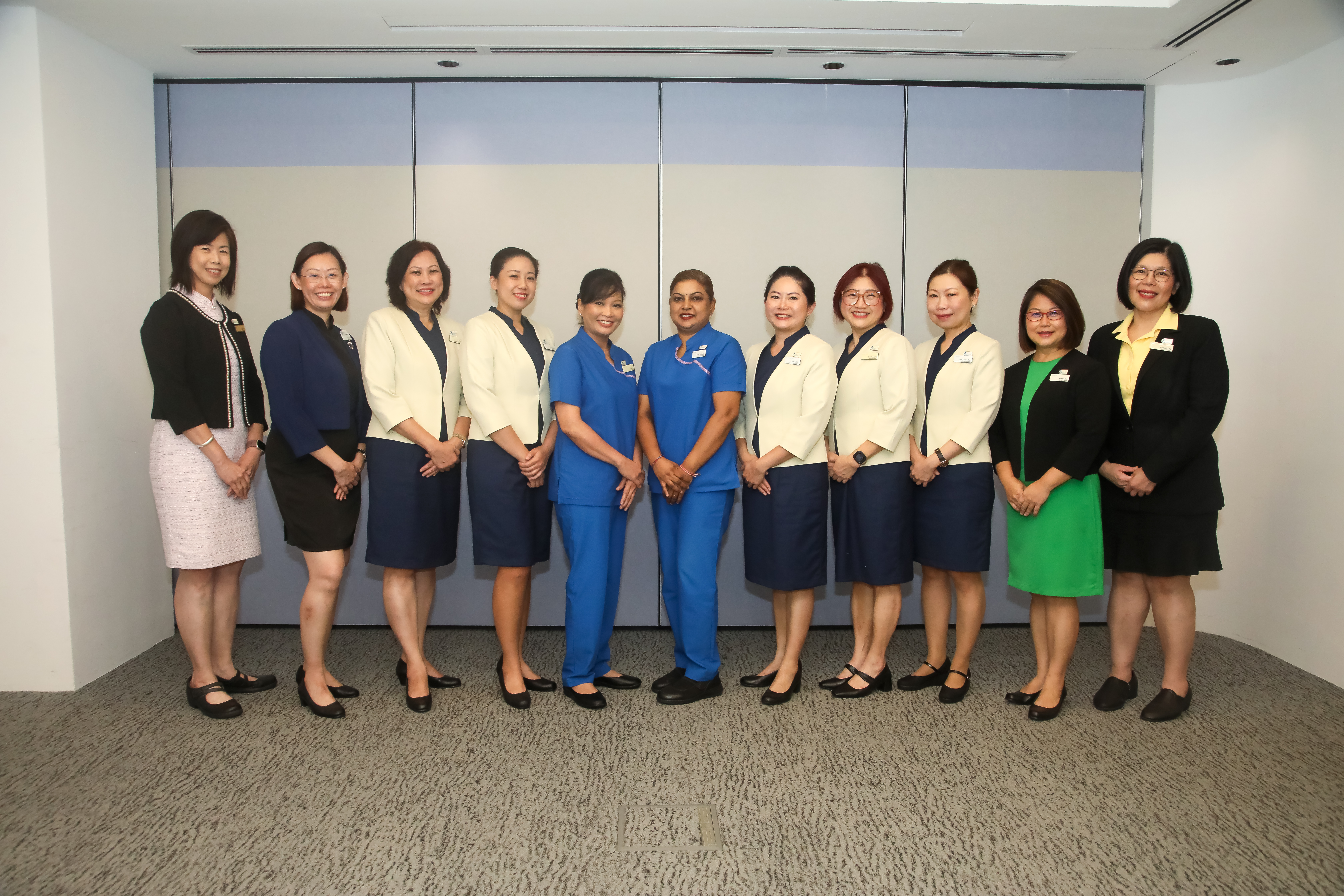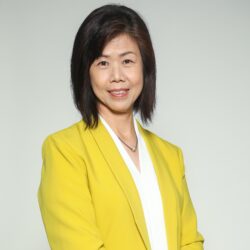Improve healthcare and empower people transformation with GenAI
- Shawn Liew

The IHH Healthcare Singapore team, led by Sally Lim, Director of Nursing (first from left), believes in embracing technologies that can help deliver safer and better patient care while improving efficiency. They also embrace lifelong learning and are always exploring how technologies can support this drive to learn.
A seasoned healthcare professional with almost 40 years of experience, Sally Lim is Director of Nursing at IHH Healthcare Singapore. Throughout this journey of discovery, she has encountered change in various guises, but perhaps none has been as all-encompassing as the introduction of artificial intelligence (AI) into the workplace.
Speaking with HRM Asia, Lim provided a glimpse into how AI has transformed the healthcare system, and how it has brought more efficiency and productivity to the role of the nurse.
You have been in the healthcare sector for almost 40 years. Can you take us through this personal journey and what has changed for you?
Sally Lim: I would use the analogy of a tree growing from a seedling to a mature tree. When the seedling is young, it requires a lot of care and support to help it to grow. As the seedling becomes a young tree and starts to produce flowers and bear fruits, it can provide shade, and some of the branches may be used for other purposes to benefit a larger population. When the tree matures, it can produce more seedlings, and from one tree, a small forest can develop.
From when I was a student and junior nurse, my seniors, allied-health colleagues, peers, and doctors gave me a lot of support and guidance to help me care for my patients and grow as a nurse. As I gained more experience, I started to nurse patients with more complex conditions. By sharing my knowledge and skills, I can mentor others too. It is a journey from receiving guidance and support in my younger days to my present stage, where I can provide guidance and support to my colleagues.
My circle of care and responsibilities also expanded. While I used to just focus solely on caring for patients, I now also care for and plan developmental targets and standards for the nurses and staff in the nursing division at IHH Healthcare Singapore (IHH SG). It is not just about my own competencies and standards; I continuously look for ways to elevate the competencies and standards of all the nursing employees at IHH SG so that we can provide a safe and caring environment for patients’ health while being a good employer, offering staff development and supporting their career aspirations.
As a healthcare provider, what have been some of the biggest challenges you have faced in having to balance work and personal life?
Sally Lim: Personally, I do not face many challenges in striving for work-life balance. I came into nursing knowing that this is a physically demanding job. One needs to have the mental agility for sudden changes in a patient’s condition, be able to shoulder the responsibility of another human life, and handle the emotional changes experienced while nursing end-of-life patients. I learned to keep work and personal life separate once I put on my uniform and likewise when I am at home. Of course, the line was more blurred when I first became a leader, but I have learned that it is important to keep work and personal life separate so that we do not get burned out.
For many nurses on shift work, working over weekends/public holidays and managing family care (child and elderly) may be challenging from time to time. Anticipation and good planning are important to reduce conflict between the two roles. Seeking help early from leaders and being open to suggestions will also help.
What was the reaction from your team and yourself when you learnt that AI will be implemented across your work; were there any initial apprehension or concerns?
Sally Lim: Nurses believe in lifelong learning and we are keen to improve care and efficiency; any technologies that can help in these aspects are always welcome. For example, nurses cannot be by the patient’s bedside all the time. The use of an AI fall prevention and detection system in our hospital wards helps to monitor patients and keep them safe. The AI system detects patients who have moved closer to the edge of the bed and alerts nurses to check on patients. Patients may reject the AI system if they do not understand how it works, and we work on patient acceptance as they need to agree to let us switch on the system for monitoring. As with anything new, nurses also learned how to operate the system and incorporate this into their daily process to monitor patients.
Mount Elizabeth Hospital and Mount Elizabeth Novena Hospital began using an AI system to help with manpower rostering in February 2024, and the AI system is ready to go live at Gleneagles and Parkway East Hospitals. Planning staff rosters is a complex task, taking in many considerations such as Ministry of Manpower (MOM) guidelines, staff requests, and operational needs, to name a few. The AI rostering system reduces time spent planning rosters from four-six hours to 30 minutes and frees our nurses for other duties.
When did IHH SG nurses start using AI and how has the technology transformed the way you and your team work?
Sally Lim: Mount Elizabeth Novena Hospital started using an AI fall prevention system in early August 2020, and this became available at all IHH SG hospitals in July 2023.
 “Nurses embrace technologies that can help deliver safer and better patient care while improving efficiency… Technology, when used appropriately, can transform our healthcare system to be safer and more efficient.” – Sally Lim, Director of Nursing, IHH Healthcare Singapore.
“Nurses embrace technologies that can help deliver safer and better patient care while improving efficiency… Technology, when used appropriately, can transform our healthcare system to be safer and more efficient.” – Sally Lim, Director of Nursing, IHH Healthcare Singapore.
In addition, as mentioned before, Mount Elizabeth Hospital and Mount Elizabeth Novena Hospital began using an AI system to help with manpower rostering in February 2024, and the AI system is ready to go live at Gleneagles and Parkway East Hospitals.
READ MORE: HR’s human touch: Indispensable in the AI world
Nurses embrace technologies that can help deliver safer and better patient care while improving efficiency. The use of the Electronic Medical Record (EMR) and Medical Device Interface (MDI) systems and now AI technology, enables nurses to devote more time for direct nursing care with the patients. Before the EMR was introduced, we had to look for the document files to document or retrieve information on patient care. MDI improves efficiency and reduces the need for transcription of parameters from vital signs machines to charts on paper or electronic records. With EMR, the doctors have the most up-to-date vital signs for decision-making when reviewing the patients. Technology, when used appropriately, can transform our healthcare system to be safer and more efficient.
For more news and analysis on the latest HR and workforce trends in Asia, subscribe to HRM Asia and be part of the region’s largest HR community!






